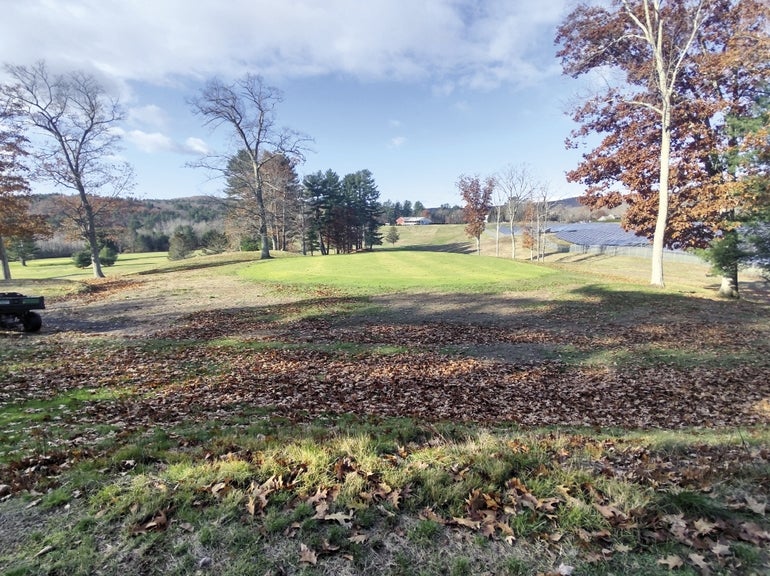The former Dunroamin Country Club is a microcosm reflecting the turbulent ups and downs the entire golf course industry has experienced over the last three decades.
Get Instant Access to This Article
Subscribe to Worcester Business Journal and get immediate access to all of our subscriber-only content and much more.
- Critical Central Massachusetts business news updated daily.
- Immediate access to all subscriber-only content on our website.
- Bi-weekly print or digital editions of our award-winning publication.
- Special bonus issues like the WBJ Book of Lists.
- Exclusive ticket prize draws for our in-person events.
Click here to purchase a paywall bypass link for this article.
Since opening its course in 1966, generations of golfers have enjoyed the greens at Dunroamin Country Club in the Hardwick village of Gilbertville.
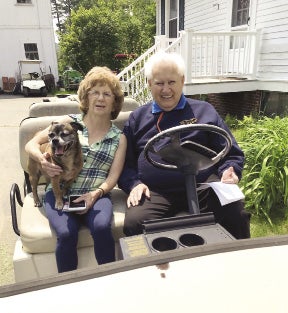
Tony Staiti and his father built the 77-acre golf course together, and throughout the years four generations of the Staiti family have overseen the course.
While the course was popular with locals, Staiti said a series of economic recessions coupled with a number of outside factors lead to dwindling memberships. Faced with the financial reality of declining golf attendance, Staiti decided to close the course in 2018 and turn half the property into a solar farm, in order to receive a steady source of income.
Staiti was in the process of negotiating contracts for another solar farm on the property when he was approached by Kenneth Uracius, owner of Stone & Lime Inc., an historic restoration business in North Brookfield.
Admittedly not a golfer himself, Uracius saw the golf course and country club as an investment opportunity with endless future potential. The two men made the business deal with a handshake in a golf cart, and since then major construction has gone into restoring the greens and overhauling the former club house.
The serendipitous timing was not just perfect for Staiti, who is happy to stay on as a consultant and see the golf course come back to life, but it also reflects the high demand for golf courses in a post-lockdown world, especially among younger golfers.
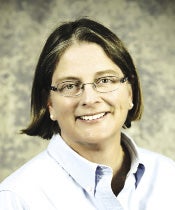
The former Dunroamin Country Club is a microcosm reflecting the turbulent ups and downs the entire golf course industry has experienced over the last three decades, said Elaine Gebhardt, executive director of the New England Golf Course Owners Association.
“The courses quickly became really busy because there were so few options out there for people during the pandemic. The other thing that came into play was the ability to work from home led to more flexibility in peoples’ work/play schedules.” Gebhardt said about the boost the coronavirus pandemic provided to golf.
A local landmark revived
The revival of the Gilbertville golf course combines the full support and golf expertise of the previous owner with the future vision of its present owner.
Frank Kulig works as the golf course superintendent at Ludlow Country Club and was recruited by Uracius to oversee the restoration of the golf course and clubhouse construction. Kulig himself grew up playing golf on the Staiti family-run course and is excited to oversee its new transformation, especially after the course’s hiatus left a hole in the small community.
“People were sad when this place closed, but now the excitement level is high. I would not even be in the golf course business if it were not for this place,” Kulig said.
Kulig has witnessed a boom in the golf industry, especially among younger generations who were looking for something to do that was socially distanced, nature-based, and calming during the stressful lockdown periods. At Ludlow Country Club, the number of junior golfers jumped from eight to 70 over the past two years, Kulig said.
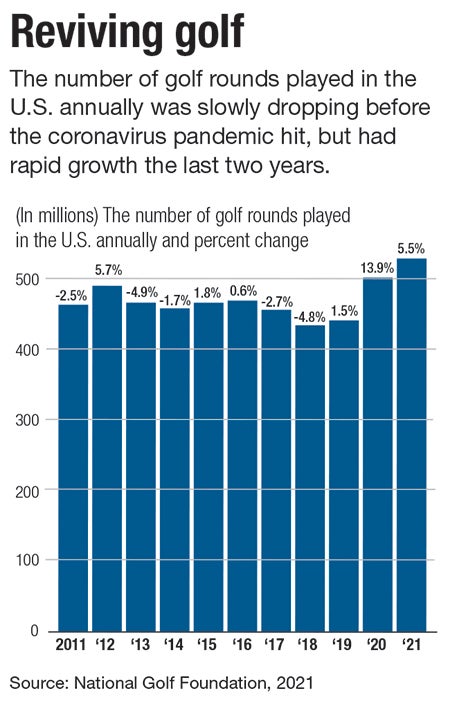
This rapid growth, particularly among younger players, is a trend felt throughout the industry, said Gebhardt. The new blood is leading to a stronger focus on family-oriented rounds, women’s programs, and diversity and inclusion. In order to retain this next generation of golfers, who will sustain the industry moving forward, golf courses are relaxing previous strict etiquette rules and clothing standards, Gebhardt said.
Kulig’s goal is to take part in this new growth by attracting experienced golfers, new golfers, or even reaching out to those who have no interest in the sport but are just looking for a local place to socialize and celebrate milestones.
Every aspect of the business is being reinvisioned, starting with the course’s name, which will be Hardwick Crossings Country Club. In addition to the golf course, Hardwick Crossings will feature a full tavern-style restaurant, bar, and a venue for special events.
The hope is the golf course and subsequent events like weddings will draw people into town and further boost the local economy while offering job opportunities, Kulig said.
Hardwick Crossings will open to the public with the bar in May and the golf course in July.
Post-pandemic world growth
New England is home to about 800 golf courses. Gebhardt said the story of golf courses like Dunroamin is an all too familiar tale of a family-run golf course forced to close up shop for more financially stable options. Fortunately, the Gilbertville golf course is getting its second chance as Hardwick Crossings just as the industry is trending upward.
The golf course industry has had a turbulent journey starting in the 1990s, when the housing development boom led to the creation of many golf courses. The increase further grew when famed golf player Tiger Woods came on the scene, further boosting public interest. Eventually there was an oversupply in the market, which ultimately fell as the Woods craze faded and recessions led to housing market crashes, Gebhardt said.
Faced with dwindling memberships, rising costs, and land worth more as buildable turf for developers rather than an actual golf course, golf course owners sold their land or transitioned to solar farms, such as the Staiti family had originally opted to do.
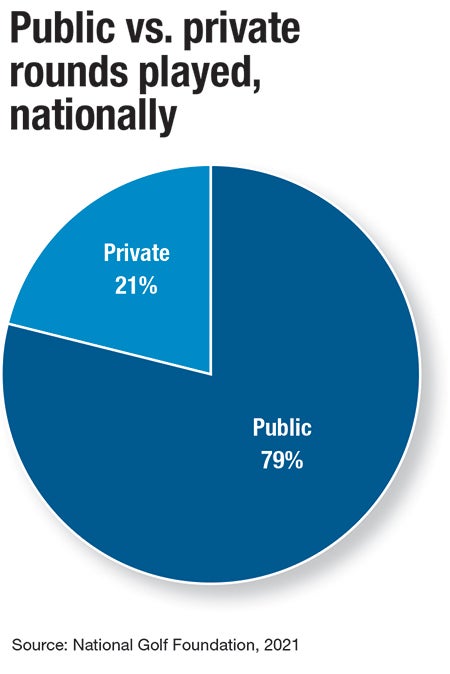
In an unexpected turn of events, the COVID-19 lockdowns re-energized the golf industry as people sought a safe activity to partake in during the peak of the pandemic.
Prior to the pandemic, golf courses were only busy over the weekends and before nightfall, but Gebhardt said golf courses after the pandemic are busy everyday during the week and are booking tee times as late as 6:30 p.m.
Nearly 529 million rounds of golf were played in 2021, a substantial increase from the 463 million rounds played in 2011 and reversing a downward trend for the industry, according to the National Golf Foundation.
“We’re on the right trend. Nobody would ever in a million years wish a pandemic on us, but the pandemic has actually been a real plus for the golf industry in that it's brought people back to the game. It's forced some of our operators and owners to rethink how they run their facilities,” Gebhardt said.
